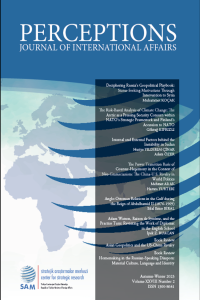Deciphering Russia’s Geopolitical Playbook: Status-Seeking Motivations Through Intervention to Syria
Abstract
This article analyzes the influence of status-aspiration in Russia’s military involvement in Syria. By leveraging the literature on status and empirical evidence, I posit that Russia’s ambition for prestigious power recognition, rooted in its search for ontological security, has played a significant role in shaping its involvement in Syria. The existing scholarly discourse has considered the status impact on Russia’s foreign policies; however, this article differentiates itself by scrutinizing Russia’s strategic objectives, rhetoric, and maneuvers throughout its Syrian intervention, while investigating the degree to which status-aspiration motivations coalesce with other elements to mold its participation in the conflict. By spotlighting the historical continuum, I further propose that military interventions have functioned as a vehicle for Russia to affirm its prestigious power status following the failure of nonmilitary
strategies to secure recognition of a great power status in the 1990s. Aside from its contribution to the literature, this study also carries pragmatic implications for policymakers in forecasting and reacting to Russia’s moves, thereby enriching the nuanced comprehension of its foreign policy conduct and its consequential effects on regional and global stability.
Keywords
Russian foreign policy status-seeking behavior military intervention Syria great power status Middle East international security
References
- References are indicated in the article.
Abstract
References
- References are indicated in the article.
Details
| Primary Language | English |
|---|---|
| Subjects | Politics in International Relations |
| Journal Section | Articles |
| Authors | |
| Publication Date | December 26, 2023 |
| Published in Issue | Year 2023 Volume: 28 Issue: 2 |

